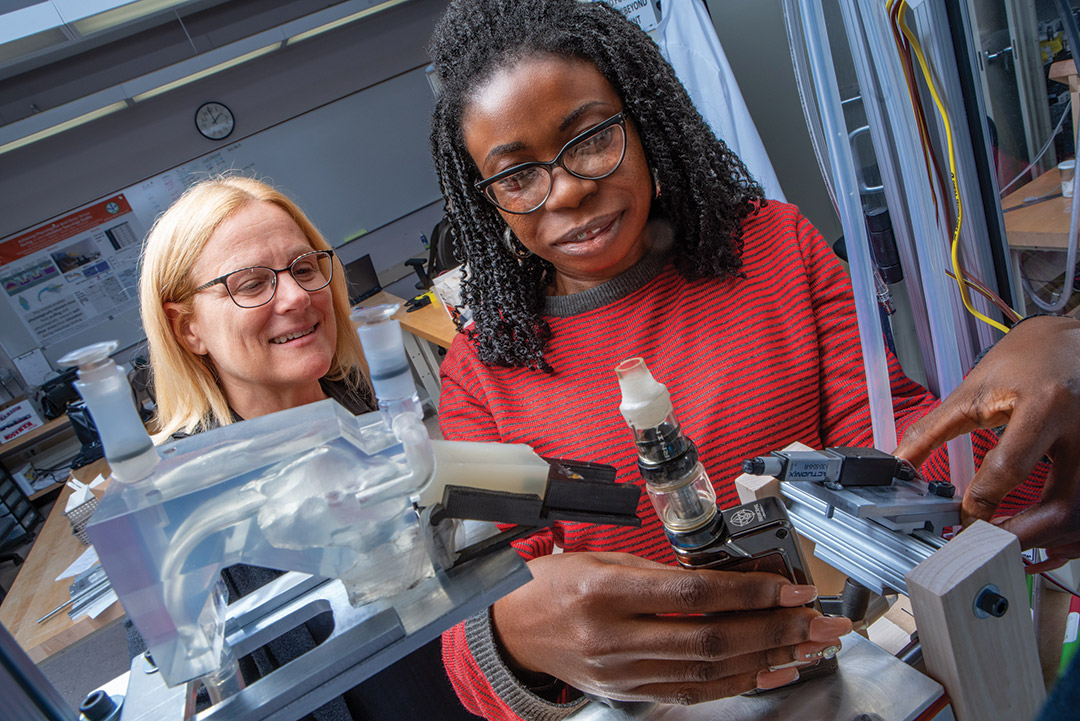RIT reaccreditation process focuses on student success, research, and community well-being
Scott Hamilton/RIT
Student success—graduating on time, positive financial outcomes, career and life skills, experiential learning, and support services—is a major priority area in RIT’s reaccreditation process. Here, faculty member Risa Robinson, left, works with Ph.D. student Gloria Mbaka.
Rochester Institute of Technology’s reaccreditation process with the Middle States Commission on Higher Education has reached new milestones this fall.
The universitywide effort will not only reaffirm RIT’s commitment to academic excellence but will also serve as a platform to reflect on its strengths, innovate in key areas, and set transformative goals, university leaders said.
RIT President David Munson, in a recent update to the university community, highlighted the importance of this reaccreditation in the university’s ongoing evolution. “Our self-study process will guide us to reflect on our strengths and distinctiveness, as well as our shortcomings and challenges,” he said. “This is a major event in the life of the university. It invites us to innovate for the benefit of our students. And it allows us to transform our future based on opportunities uncovered so that we continue to be a leader in higher education.”
The reaccreditation effort is being spearheaded by a universitywide steering sommittee led by Chris Licata, vice provost for Academic Affairs and accreditation liaison officer; Larry Buckley, associate professor and senior associate dean, College of Science; and Risa Robinson, professor, Department of Mechanical Engineering, Kate Gleason College of Engineering.
The committee has already made significant progress, with the approval of RIT’s Self-Study Design, a foundational document outlining the approach the university will take to complete its self-study.
Three core priorities have been identified as the focal points of the self-study: student success, research, and community well-being. These priorities are supported by three Affiliate Groups established to assist in analyzing and addressing the university’s goals.
As part of the reaccreditation process, RIT aims to submit its final self-study by early spring 2026, marking nearly a decade since the university’s last evaluation in 2017. Knowledge gained from the accreditation process will also work in tandem with the new RIT Strategic Plan that is being developed along a similar timeline. The Steering Committee will also provide RIT governance groups with an update later this semester.
“This is a tremendous opportunity to involve the community in telling the RIT story about how we align with the seven MSCHE quality standards and where there is room for strategic and creative enhancement or improvement,” said Licata. “The Middle States Commission is made up of more than 500 member schools from Maryland to New York and is one of six regional accrediting agencies recognized by the U.S. Department of Education. A school must be accredited from one of these agencies to provide federal financial aid to its students, but beyond that, these agencies strive to use peer review and collectively established standards to ensure academic rigor and quality.”
For more information about the reaccreditation process, including key timelines, committee members, and ongoing updates, the university community is encouraged to go to the updates portion of the RIT accreditation website.









